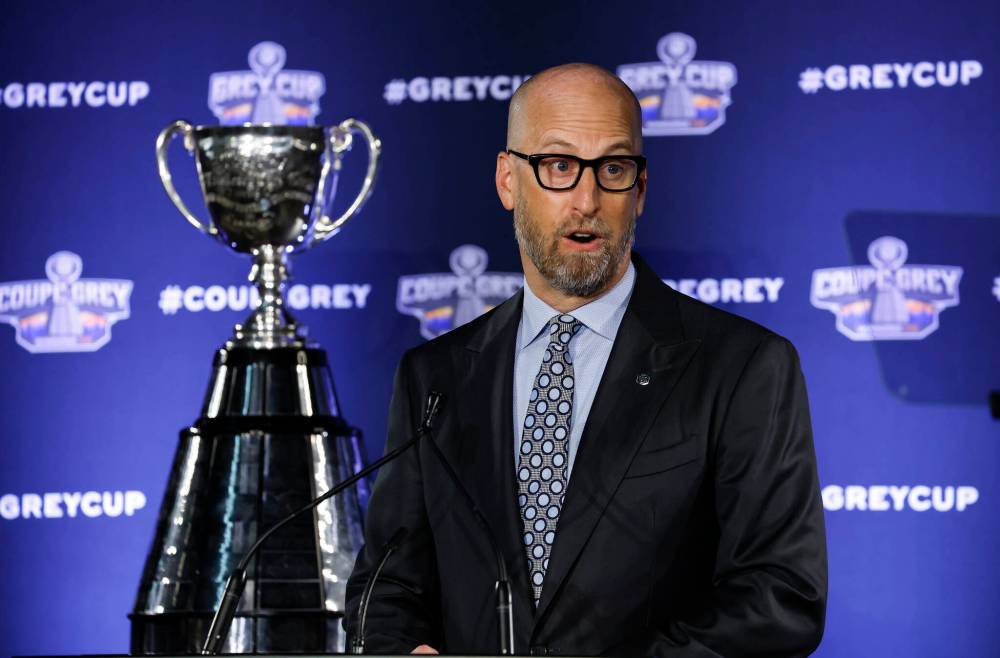CFL’s Johnston guarantees three-downs will not change
Lack of consultation remained talking point at State of the League address
Advertisement
Read this article for free:
or
Already have an account? Log in here »
To continue reading, please subscribe:
Monthly Digital Subscription
$1 per week for 24 weeks*
- Enjoy unlimited reading on winnipegfreepress.com
- Read the E-Edition, our digital replica newspaper
- Access News Break, our award-winning app
- Play interactive puzzles
*Billed as $4.00 plus GST every four weeks. After 24 weeks, price increases to the regular rate of $19.95 plus GST every four weeks. Offer available to new and qualified returning subscribers only. Cancel any time.
Monthly Digital Subscription
$4.99/week*
- Enjoy unlimited reading on winnipegfreepress.com
- Read the E-Edition, our digital replica newspaper
- Access News Break, our award-winning app
- Play interactive puzzles
*Billed as $19.95 plus GST every four weeks. Cancel any time.
To continue reading, please subscribe:
Add Free Press access to your Brandon Sun subscription for only an additional
$1 for the first 4 weeks*
*Your next subscription payment will increase by $1.00 and you will be charged $16.99 plus GST for four weeks. After four weeks, your payment will increase to $23.99 plus GST every four weeks.
Read unlimited articles for free today:
or
Already have an account? Log in here »
Commissioner Stewart Johnston was hardly on the job for six months before he rocked the Canadian Football League by implementing significant structural changes to the three-down game over the next two years.
While the CFL’s annual state of the league address always offers a full overview of the league’s health and future, this year’s session carried some extra weight.
JOHN WOODS / THE CANADIAN PRESS CFL commissioner Stewart Johnston addresses the media at the 2025 CFL State of the League presentation on Friday.
The controversy over the league’s new rules — including the modified rouge and 35-second play clock in 2026, followed by the shortened field and goalposts moving to the back of reduced end zones in 2027 — meant many fans and other stakeholders were less interested in the usual corporate talk and more focused on getting clear answers.
Here are the key takeaways from Johnston’s address and the subsequent back and forth with reporters, offering a peek behind the curtain at where the CFL is focused as it heads into another critical off-season.
1) Johnston created quite the stir during the announcement of the new rules back in September when he was asked to guarantee there wouldn’t be a move to four downs but couldn’t do it, saying there’s no guarantees in life. He admitted that comment was a misstep and clarified that not only can he guarantee the game will stay with three downs, but that they’ve never once considered the idea in the first place.
2) Johnston was pressed repeatedly why he didn’t first consult the nine teams or the league’s fans before making significant structural changes to the CFL game, instead opting to keep within a small group behind closed doors.
He never actually answered the question, which was put to him at least three different ways; rather, he deflected by focusing on the “300 years of combined experience” of the league’s Board of Governors. Of all the things the commissioner owned up to, he wasn’t going to apologize for why he kept his decision to limit consultation.
3) What definitely stood out was how many times Johnston noted the high volume of positive feedback he’s been hearing about the new rules. He went as far as to say there was overwhelming support for the new rules by coaches, players and fans.
However, that assessment runs counter to my experience, at least here in Winnipeg. And when I talked to the CFL Players Association, they were taking a cautious approach, focusing their frustration not on the rules themselves, but that they were never consulted.
4) U.S. expansion was a popular topic, something Johnston also dismissed. He went as far as saying if there was going to be a 10th team — and, to be clear, he wants a 10th team — it was going to be from Canada.
The CFL has flirted with a team in Atlantic Canada, and they know how passionate the football fans are in Quebec City. But while former commissioner Randy Ambrosie seemed to stake his legacy on expansion, Johnston doesn’t seem nearly as focused on the topic, going as far as to say it isn’t in his top three priorities.
5) Both Saskatchewan Roughriders head coach Corey Mace and Montreal Alouettes sideline boss Jason Maas were emphatic in voicing their displeasure about the league’s football operations cap.
That’s a sentiment shared by all nine teams, their argument being by limiting how much you spend on coaches and team personnel, you inevitably hurt the on-field product. Johnston doesn’t seem nearly as convinced.
While I’m sure he would like all teams to have the best staffs available, the cap creates a competitive playing field across the league. While he didn’t mention a specific dollar value, he said the cap has gone up in each of the last four years, after starting at $2.6 million in 2018.
6) I had a feeling all week, and even shared it with my colleagues, that Johnston was going to make a notable announcement ahead of the Q&A session of his address. I thought that because what better way to deflect away attention from the rule changes.
That’s exactly what happened, as the CFL announced it was rolling out new team websites and a smartphone app. While long overdue, the CFL deserves credit for taking these steps, as it should help attract the attention of a younger audience. In other good news, Genius Sports — the company responsible for the league’s inconsistent stats program — has nothing to do with this new endeavour.
7) Making player salaries public has been a conversation for as long as I can remember. But the possibility of it happening has never felt more real than it does now.
Johnston said he was interested in discussing that with the league’s stakeholders, notably the players, at the winter meetings in January. The CFLPA is likely the key obstacle here, as they claim privacy for their players is a top priority. They’ve discussed the idea of publicizing salaries in their last three annual general meetings, but clearly there’s little interest from the players, as nothing has come of it.
8) Another item on the docket for the league’s winter meetings is discussing ways to make the replay centre more consistent and effective. The replay centre has been a constant frustration among fans, many of whom see it as extremely random when making a decision to intervene in a game. Johnston noted he spent an entire game in the replay centre this year, observing how they work. It will be interesting to see how this area can be improved, if at all.
9) Gambling has wreaked havoc on professional sports in recent years, questioning the integrity of the NBA and MLB and leading to criminal charges being laid. Players aiding or betting on their own game props has been a particular issue.
The vulnerability is heightened in the CFL, given its comparatively smaller overall resources, making it more susceptible to match-fixing. Johnston said they take match manipulation very seriously, including annual education not just for players and coaches but all staff. He added that the CFL has external experts who monitor betting patterns and other irregularities. In fact, the commissioner said five games this season triggered an alert, but after investigating each one, it proved to be nothing.
10) The CFLPA is getting ready to issue its second annual team report cards, which involves each club getting a letter grade for everything from football operations, to family treatment, to team travel and nutrition and diet.
It’s led to positive changes across the league, making this year’s reports all the more interesting. But it also comes at an equally interesting time, as the NFL is currently grieving against the NFLPA for issuing report cards, claiming it violates a CBA clause that limits public comments expressing “criticism of any club, its coach, or its operation and policy.”
Johnston was asked if he’d one day follow the NFL’s lead, but denied an interest in doing so, noting he’s enjoyed building the relationship with the players.
jeff.hamilton@freepress.mb.ca

Jeff Hamilton
Multimedia producer
Jeff Hamilton is a sports and investigative reporter. Jeff joined the Free Press newsroom in April 2015, and has been covering the local sports scene since graduating from Carleton University’s journalism program in 2012. Read more about Jeff.
Every piece of reporting Jeff produces is reviewed by an editing team before it is posted online or published in print — part of the Free Press‘s tradition, since 1872, of producing reliable independent journalism. Read more about Free Press’s history and mandate, and learn how our newsroom operates.
Our newsroom depends on a growing audience of readers to power our journalism. If you are not a paid reader, please consider becoming a subscriber.
Our newsroom depends on its audience of readers to power our journalism. Thank you for your support.







